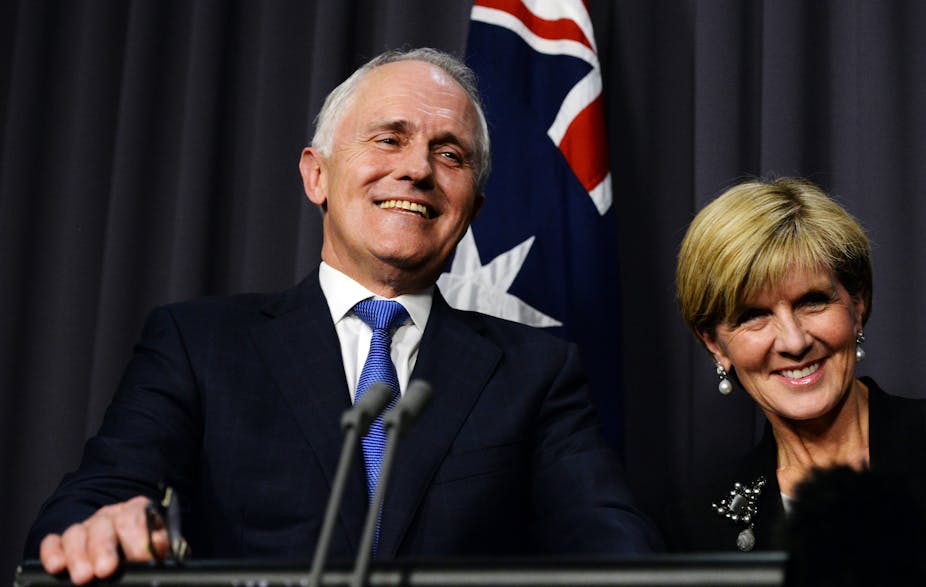Prime Minister-designate Malcolm Turnbull has promised to be a consultative leader who runs a traditional collaborative cabinet government, as he quickly moved to distance his approach from the arbitrary, unpredictable one of the man he had just dispatched with surgical skill.
“There are few things more important in any organisation than its culture,” Turnbull told his news conference on Monday night, after trouncing Tony Abbott in a party room ballot by a decisive 54-44. “The Prime Minister of Australia is not a president. The prime minister is the first among equals.”
The Liberal Party was a broad church, he said, and the partyroom remarkably diverse in life experience and views. “That is why a culture of engagement, of consultation, of collaboration is so absolutely necessary.”
Turnbull said his would be a “thoroughly Liberal government committed to freedom, the individual and the market”.
On the vexed issue of the economy and business, he said a key element was confidence “and you build confidence by explaining what the problem is, making sure people understand it and then setting out the options for dealing with it”. He pointed to the example of New Zealand Prime Minister John Key, who had been able to achieve very significant economic reforms by explaining complex issues and then making the case for them.
In his other main point, Turnbull said he assumed the parliament would run full term. That means he will have a year to set his stamp on the government and prepare an agenda to take to the people.
For Turnbull, Monday night’s vote fulfils what he has always seen as his destiny. But how easily he could have missed that destiny – if Abbott had avoided those unforced errors and earlier, if he himself had gone ahead, after Abbott rolled him as opposition leader in 2009, with his announced plan to quit parliament.
The parliamentary Liberal Party has installed Turnbull for the very pragmatic reason that so many of them feared they were doomed under Abbott, who has stirred a visceral antipathy among voters.
The elevation of Turnbull will terrify Labor. The unpopular Abbott and the lacklustre Bill Shorten were quite a match – each had an interest in the other’s survival. The charismatic Turnbull is, on the face of it, a much more attractive proposition than either of them.
Nevertheless Turnbull arrives with a deal of baggage, personal and political. He is not a Mike Baird.
How well Turnbull does as prime minister will be determined in part by whether he has changed since he led before, when he was often fractious with colleagues, a poor manager of his party and, for all his eloquence, actually not a particularly good communicator, as a look at the polls of the time will attest. It’s easier to shine when the pressure is not on.
Second time around as leader, Turnbull will have to display much better people skills.
He is a left-leaning leader in a distinctly right-leaning party. It will be a stretch to reconcile his beliefs with the views of a majority of his followers. He has already made compromises on his view on climate policy and the proposed same-sex marriage popular vote to win support from the right – although the same-sex plebiscite’s timing surely will be brought forward from the Abbott plan.
In the end, the political execution of Abbott was a remarkably quick and efficiently planned operation. Despite the never-ending speculation, it was a surprise when it came. But it will leave serious divisions. Unlike Julia Gillard’s vague explanation when she knifed Kevin Rudd – that she had to act because the government had lost its way – Turnbull’s attack on Abbott, when he announced his bid, was direct and brutal. So was the fightback from the Abbott forces.
There will be more pain to come in the reshuffle Turnbull will make. Treasurer Joe Hockey will either quit his post or be sacked, and there will be other casualties. After it all, Turnbull will have to bring things together.
How difficult that proves will depend considerably on how those who voted against Turnbull accept the new order. Abbott himself wouldn’t have much capacity to be a troublemaker, even if he wanted to be. Unlike Rudd, he has no comeback capacity, ever.
The fall of Abbott is the story of an accidental leader – the unlikely winner by one vote in 2009 – who never made the transition from opposition to government.
The flaws of Rudd and Gillard made it so easy for Abbott to wear them down by negativity such that he never had to acquire the more positive skills that governing requires.
Surprisingly, after inflicting terrible damage on Gillard over her breach of trust on the carbon tax, Abbott broke promises willy nilly-himself, seemingly unable to foresee the inevitable consequences. He ran a tribal, ideological government. As the postmortems of his brief and unsuccessful prime ministership are written, his dominating chief-of-staff Peta Credlin will be loaded with a good deal of blame by many Liberals.
It has been a dreadful period in recent federal political history, following two disastrous Labor terms. In each of these three parliamentary terms, a prime minister has been tossed out by their party. The trashing of trust, instability, the never-ending election campaign, and what has become a destructive media cycle have meant the Australian public have been short-changed under three prime ministers (one with two stints). Whether Turnbull can break the mould we shall see.

